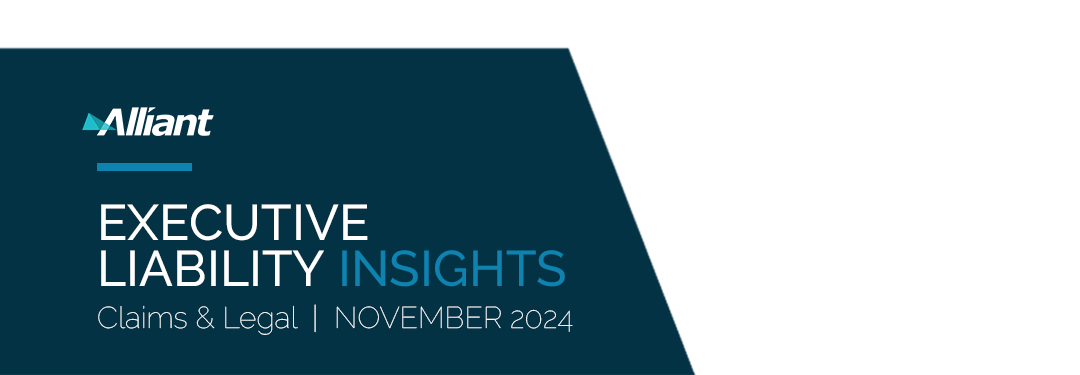
Navigating today’s complex risk environment can be a monumental task. Steve Shappell, Alliant Claims & Legal, spearheads Executive Liability Insights, a monthly review of news, legal developments and information on executive liability, cyber risk, employment practices liability, class action trends and more.


FEATURED ARTICLE
EXCESS CARRIERS CANNOT CHALLENGE PAYMENTS OF UNDERLYING INSURERS
Fed. Home Loan Mortg. Corp. v. Twin City Fire Ins. Co., No. 23-cv-1758-CRC (D.D.C., Nov. 8, 2024).
A U.S. district court ruled against an excess insurer who argued that one of the underlying layers of coverage was not properly exhausted and therefore, coverage under its layer had not been triggered. The court’s decision reinforced the notion that excess insurers cannot avoid coverage obligations simply by disagreeing with how the underlying coverage was eroded or how such underlying proceeds were spent.
In This Issue:
COURT REJECTS NUMEROUS ATTEMPTS BY D&O INSURER TO DENY COVERAGE UNDER A-SIDE COVERAGE
Jasper v. Chubb Nat'l Ins. Co., 2024 Cal. App. Unpub. LEXIS 7136 (Cal. Ct. App., Nov. 12, 2024).
The SEC filed a civil enforcement action against the former CFO of a semiconductor manufacturer (the “Company”) for securities violations relating to stock option backdating and inaccurate regulatory filings. The Company paid the CFO’s defense costs pursuant to an Indemnification Agreement that required the Company to indemnify the CFO and advance defense costs for any action brought against him in his capacity as a corporate officer.
Read More >>
UNDISCLOSED RISK BEFORE THE PROFESSIONAL LIABILITY POLICY’S INCEPTION IS THE PATHWAY TO RESCISSION LITIGATION
RLI Ins. Co. v. Cornerstone Land & Inv. Grp., Inc., 2024 U.S. Dist. LEXIS 199088 (9th Cir., 31 Oct. 2024).
An insurer sought to rescind professional liability coverage against a real estate company (the “Company”) for failure to disclose a risk that the Company learned of just days after signing the insurance application.
Read More >>
D&O INSURERS OF A PHARMACY TO PAY ONE OF THE LARGEST DERIVATIVE SETTLEMENTS RELATING TO OPIOID LITIGATION
A large pharmacy chain in the United States (the “Pharmacy”) reached one of the largest settlements among derivative lawsuits. The settlement was for an opioid-related shareholder derivative lawsuit alleging a breach of duty of oversight.
Read More >>
MASSACHUSETTS SUPREME COURT FINDS WIRETAP LAWS FAIL TO SUPPORT WEBSITE TRACKING SOFTWARE CLAIMS
Vita v. New England Baptist Hosp., No. SJC-13542 (Mass., Oct. 24, 2024).
The Massachusetts Supreme Judicial Court upheld the dismissal of class action lawsuits filed against two hospitals alleging they violated the privacy of users by tracking the users’ web-browsing activities on their sites. Specifically, the court rejected the applicability of the state’s wiretap statute to the claims.
Read More >>
COVERAGE DENIED FOR LATE NOTICE
Bridges v. Maxum Indem. Co., 2024 U.S. Dist. LEXIS 201275 (E.D. Mich., Nov. 5, 2024).
A federal district court ruled that there was no coverage for a malpractice claim under a lawyer’s professional liability policy and subsequent policies, because the insured failed to satisfy the policies’ notice and reporting requirements. The insured was sued for malpractice after they failed to timely respond to a motion for summary judgment and the underlying medical malpractice case was dismissed.
Read More >>
CYBER CORNER
Click to read the following cases:
- NEW YORK ATTORNEY GENERAL FINES HEALTHCARE PROVIDER FOR CYBERSECURITY LAPSES
- SOLARWINDS BREACH DISCLOSURES BY TECH COMPANIES RESULT IN SEC FINES
- CUSTOMER LOYALTY WANES IN THE WORLD OF CYBER ATTACKS
Read More >>
EMPLOYMENT CORNER
Click to read the following cases:
- THE SEC HINTS THAT STANDING IN THE WAY OF WHISTLEBLOWERS CAN BE EXPENSIVE FOR PUBLIC COMPANIES
- COURT FINDS COSTS OF CORRECTION QUALIFY AS COVERED LOSS
- THE SUPREME COURT TO ADDRESS CIRCUIT SPLIT ON ERISA PROHIBITED TRANSACTION CLAIMS
Read More >>
SECURITIES CORNER
Click to read the following cases:
- INVESTMENT ADVISOR FOR “ESG” FUNDS ORDERED TO PAY $4 MILLION FOR COAL, NATURAL GAS AND TOBACCO INVESTMENTS
- SEC RELEASES EXAMINATION PRIORITIES FOR FISCAL YEAR 2025
- TECH GIANT PAYS MASSIVE SETTLEMENT TO RESOLVE ANTITRUST LAWSUIT
- OCTOBER 2024 NOTEWORTHY ENFORCEMENT ACTIONS FILED
- OCTOBER 2024 NOTEWORTHY SETTLEMENTS AND JUDGEMENTS
Read More >>
SHAREHOLDER CORNER
Click to read the following cases:
- OCTOBER 2024 SECURITIES CLASS ACTION FILINGS
Read More >>
EXCESS CARRIERS CANNOT CHALLENGE PAYMENTS OF UNDERLYING INSURERS
Fed. Home Loan Mortg. Corp. v. Twin City Fire Ins. Co., No. 23-cv-1758-CRC (D.D.C., Nov. 8, 2024).


A U.S. district court ruled against an excess insurer who argued that one of the underlying layers of coverage was not properly exhausted and therefore, coverage under its layer had not been triggered. The court’s decision reinforced the notion that excess insurers cannot avoid coverage obligations simply by disagreeing with how the underlying coverage was eroded or how such underlying proceeds were spent.
This dispute arose from a complex D&O claim involving various interrelated components: shareholder litigation, an SEC investigation, and an SEC complaint. The claims arose during the 2007 mortgage crisis and involved a government-backed mortgage buyer, and substantial defense costs.
The subject D&O program was comprised of eight layers. The first four layers of insurance paid their full limits, but the next insurer in line, The Hartford, declined to pay because the underlying insurers improperly found coverage for costs incurred in responding to an SEC subpoena. The Hartford’s position was that coverage for the subpoena was not triggered because the SEC targeted the entity as opposed to any of the individual directors or officers. The court, however, did not find that a ruling on that specific issue was timely but determined it should be addressed after discovery.
In ruling in favor of coverage for the Insureds on the issue of improper exhaustion, the court relied on a fundamental principle that an excess insurer may not avoid its own liability by challenging another insurer’s decision to pay out on its claims “unless there is an indication that the payments were motivated by fraud or bad faith.”
COURT REJECTS NUMEROUS ATTEMPTS BY D&O INSURER TO DENY COVERAGE UNDER A-SIDE COVERAGE
Jasper v. Chubb Nat'l Ins. Co., 2024 Cal. App. Unpub. LEXIS 7136 (Cal. Ct. App., Nov. 12, 2024).


The SEC filed a civil enforcement action against the former CFO of a semiconductor manufacturer (the “Company”) for securities violations relating to stock option backdating and inaccurate regulatory filings. The Company paid the CFO’s defense costs pursuant to an Indemnification Agreement that required the Company to indemnify the CFO and advance defense costs for any action brought against him in his capacity as a corporate officer. The agreement characterized the advancement as an undertaking, which the CFO agreed to repay if it were determined that he was not entitled to indemnification. Derivative and class action suits followed, which were eventually settled for very large amounts, including some of the Chubb (the “carrier”) layer of D&O insurance limits. As a side note, there were hundreds of companies caught up in the “backdating” of stock options scandal, so the board member at issue was not alone in thinking that their actions did not amount to a crime.
A jury found the CFO liable for fraudulent conduct, securities fraud, and making knowingly false statements to the SEC. It was later determined that the conduct alleged in the backdating litigation was not indemnifiable under Delaware law and the CFO was liable for defense costs, as well as for repayment of the class action settlement. The Company and the CFO turned to its A-side insurance for non-indemnifiable loss.
The Company and CFO sought coverage for the defense costs, but the carrier, Chubb, denied coverage for this A-side claim based on a variety of theories, including that the CFO wrongfully obtained and was unjustly enriched by the Company’s advancement of defense costs. Thus, the carrier took the position that such costs constituted “restitutionary damages,” which were excluded from the policy’s definition of “Loss.” The carrier also asserted that coverage was prohibited by Insurance Code Section 533, which codified California's public policy against insuring criminal and fraudulent conduct.
The policy covered Non-Indemnifiable Loss which included the CFO’s liability for damages and defense costs that the Company refused to indemnify. The advancement fit squarely within the definition of non-indemnifiable Loss because, pursuant to the terms of the indemnification agreement, the CFO was legally obligated to repay the Company if it was determined that he was not entitled to indemnification. The Company refused to indemnify the CFO because the allegations against him were not indemnifiable under Delaware law. Although defense costs did not include amounts substantially equivalent to disgorgement or restitution, the carrier could not show that the Company ever paid anything to the CFO directly. Rather, the Company paid defense counsel on the CFO’s behalf pursuant to the Indemnification Agreement.
The court concluded that in the insurance context, restitution meant "the return of something wrongfully received.” The court clarified that coverage for restitution was barred only in situations where the alleged wrongdoer was required to restore to the plaintiff that which was wrongfully acquired. Here, the CFO never wrongfully obtained or kept any of the Company’s advances. Further, the court found that coverage of the CFO’s legal costs was consistent with the generally understood purpose of D&O insurance.
Regarding the carrier’s public policy argument, the court found that Section 533 “[did] not prohibit contracts providing for defense against an action alleging willful misconduct because such an agreement [did] not provide for indemnification if the insured [was] found liable.” The CFO would not profit by virtue of the policy's coverage; thus, payment of the Non-Indemnifiable Loss would not be against public policy.
In withholding A-Side coverage, Chubb also cited three exclusions: Entity v. Insured exclusion, exclusion for non-indemnifiable loss arising from improper gain or financial advantage, and exclusion for non-indemnifiable loss derived from committing a crime or fraudulent act. Importantly, the court addressed all three in two short sentences, one of which quoted Chubb’s policy’s words: “[these exclusions] shall not apply to Defense Costs.” According to the court, citing these exclusions contradicts the plain meaning of Chubb’s policy.
UNDISCLOSED RISK BEFORE THE PROFESSIONAL LIABILITY POLICY’S INCEPTION IS THE PATHWAY TO RESCISSION LITIGATION
RLI Ins. Co. v. Cornerstone Land & Inv. Grp., Inc., 2024 U.S. Dist. LEXIS 199088 (9th Cir., 31 Oct. 2024).


An insurer sought to rescind professional liability coverage against a real estate company (the “Company”) for failure to disclose a risk that the Company learned of just days after signing the insurance application.
The Company’s president signed the application, which stated that the company had no information about any “unauthorized access, unauthorized use, unauthorized disclosure, virus, denial of service attack, theft of data, fraud, electronic vandalism, sabotage, extortion, or other security events, including notification for any actual or potential compromise of information" within the last five years. The application signed by the president of the Company also stated that:
As the authorized agent, I declare that if the firm or any of its members become aware of any information that would change answers furnished in the application, the firm will reveal such information in writing to the Company prior to the effective date of coverage.
Days after signing the application, the Company became aware that its client wired a payment to a bad actor impersonating the Company. The Company promptly notified its insurance brokers; however, both failed to provide a notice to the insurer before the new policy was incepted. Once notice was provided, the insurer sought to rescind the policy and declared that it had no duty to defend the Company.
The Company sued the insurer and urged the court to stay the coverage litigation, pending the resolution of the underlying lawsuit. According to the Company, the facts that would be established in the underlying lawsuit would guide the coverage litigation. The court granted the Company’s motion although it was not persuaded that the underlying lawsuit would shed light on the issues related to the failure to disclose a known risk. Yet, the court opined that the claim seeking to declare that the insurer had no duty to defend the Company had some potential overlap with the underlying lawsuit, so it agreed to stay the coverage litigation.
Alliant will continue monitoring the resolution of this rescission litigation. However, even without coverage issues being ruled upon, this case serves as an important reminder that any known risk needs to be timely reported to insurers. More importantly, this case reiterates how important it is to draft narrow and specific application and warranty language. Such language needs to identify a narrow group of people whose knowledge would impose disclosure obligations, and such language must be limited in scope and time. Crucially, such warranty or application statements of the limited control group must never be imputed to innocent insureds.
D&O INSURERS OF A PHARMACY TO PAY ONE OF THE LARGEST DERIVATIVE SETTLEMENTS RELATING TO OPIOID LITIGATION


A large pharmacy chain in the United States (the “Pharmacy”) reached one of the largest settlements among derivative lawsuits. The settlement was for an opioid-related shareholder derivative lawsuit alleging a breach of duty of oversight.
This settlement stems from the opioid epidemic that led to the emergence of extensive securities and corporate litigation. The Pharmacy became involved in opioid litigation approximately fifteen years ago, when the Drug Enforcement Administration (“DEA”) started its investigation into the Pharmacy’s compliance with the Controlled Substances Act (the “Act”). The Pharmacy settled the matter with the DEA and agreed to implement changes to its practices; however, a series of lawsuits followed. Predictably, shareholder derivative complaints were among the lawsuits, and they alleged that the Pharmacy’s board failed to establish proper protocols to ensure compliance with the Act.
The court denied the Pharmacy’s motion to dismiss the allegations of the breach of duty of oversight—that the directors consciously ignored the absence of a robust monitoring system, which led to the compliance risk. After the motion to dismiss, the board engaged in mediation efforts and, although it maintained the position of denying all allegations, agreed to a $123M settlement to be paid by its D&O insurers.
MASSACHUSETTS SUPREME COURT FINDS WIRETAP LAWS FAIL TO SUPPORT WEBSITE TRACKING SOFTWARE CLAIMS
Vita v. New England Baptist Hosp., No. SJC-13542 (Mass., Oct. 24, 2024).


The Massachusetts Supreme Judicial Court upheld the dismissal of class action lawsuits filed against two hospitals alleging they violated the privacy of users by tracking the users’ web-browsing activities on their sites. Specifically, the court rejected the applicability of the state’s wiretap statute to the claims.
The plaintiff, a patient of the hospitals, argued that the collection of her personal information, such as her IP address and browsing history, violated her reasonable expectation of privacy and constituted a wiretap under the Wiretap Act. The court reasoned that the Massachusetts Wiretap Act (the “Act”) was enacted to protect person-to-person communications from hidden electronic surveillance. The court rejected the patient’s position that web-tracking activities involved the type of communications that the statute was intended to prohibit. In the absence of an express textual provision or an indication of legislative intent, browsing and other similar website interactions on the hospitals' websites were not "wire communications" under the Act. In the court’s view, activities such as entering a URL, accessing a specific webpage, clicking on links, and scrolling through a webpage were clearly not the type of person-to-person conversation protected by the Act. One judge dissented, suggesting that the legislature needs to revise the Act to protect consumers from such web-tracking activity.
This decision is expected to be used by defendants in similar cases across the country to limit the use of wiretap statutes to support such claims. While it does not immunize hospitals and other businesses from these types of claims under other legal theories (such as invasion of privacy or breach of contract), it should make proving these claims more difficult for the plaintiff’s bar.
COVERAGE DENIED FOR LATE NOTICE
Bridges v. Maxum Indem. Co., 2024 U.S. Dist. LEXIS 201275 (E.D. Mich., Nov. 5, 2024).


A federal district court ruled that there was no coverage for a malpractice claim under a lawyer’s professional liability policy and subsequent policies, because the insured failed to satisfy the policies’ notice and reporting requirements. The insured was sued for malpractice after they failed to timely respond to a motion for summary judgment and the underlying medical malpractice case was dismissed. The insured’s client sued for legal malpractice, which the insured settled and assigned their claims under the policies to the client. The client then brought a declaratory judgment and breach of contract action against the carriers, which was dismissed.
The policy was a "claims made" policy, providing coverage for claims made during the policy period. The claim was not reported until years after the initial dismissal of the underlying case, which was after the expiration of the policy period and the two-year extended reporting period. Therefore, no coverage was afforded under the initial policy. The client alleged that a notice of potential claim was reported during the extended reporting period; however, the policy provided that potential claims must be reported during the "policy period" (not the "extended reporting period") for coverage to apply to a subsequent claim.
The malpractice claim was also reported to a subsequent professional liability carrier; however, that policy excluded coverage for claims "based upon, arising out of, directly or indirectly resulting from, or in any way involving any Wrongful Act prior to the Retroactive Date or any subsequent Related Wrongful Act." The alleged wrongful act that formed the basis for the malpractice claim, failing to timely respond to the motion for summary judgment, occurred prior to the Retroactive Date and therefore did not trigger coverage.
Cyber Corner
NEW YORK ATTORNEY GENERAL FINES HEALTHCARE PROVIDER FOR CYBERSECURITY LAPSES
The New York Attorney General (the “AG”) settled with an upstate healthcare provider (the “Company”) for failing to properly secure medical data of over 2,000,000 patients. The settlement required that the Company invest $2.25 million in cybersecurity improvements and pay $1 million in penalties, half of which will be suspended pending its compliance with the order.
SOLARWINDS BREACH DISCLOSURES BY TECH COMPANIES RESULT IN SEC FINES
In the Matter of Avaya Holdings Corp., No. 3-22269,
In the Matter of Check Point Software Technologies Ltd., No. 3-22270,
In the Matter of Mimecast Ltd., No. 3-22271,
In the Matter of Unisys Corp., No. 3-22272.
The SEC has issued almost $7 million in fines against four technology companies it accused of attempting to minimize the impact of breaches to their systems in their disclosures to investors following an attack on their software provider, SolarWinds Corp.
CUSTOMER LOYALTY WANES IN THE WORLD OF CYBER ATTACKS
Hiscox’s 2024 Cyber Readiness Report (the “Report”) discusses the multifaceted impact on companies that suffered cyberattacks such as data breaches, financial losses, reputation damage, and of particular concern, customer retention. As cyber events have become more alarming and sophisticated, 67% of companies surveyed in the Report indicated an increase in cyber incidents over the past year.
Employment Corner
THE SEC HINTS THAT STANDING IN THE WAY OF WHISTLEBLOWERS CAN BE EXPENSIVE FOR PUBLIC COMPANIES
The SEC settled with several public companies (the “Companies”) in enforcement actions for violations of whistleblower protection laws. These actions stemmed from the Companies having employment, separation, and other agreements that included provisions waiving their right to monetary recovery when partaking in a government agency’s investigations.
COURT FINDS COSTS OF CORRECTION QUALIFY AS COVERED LOSS
N. Am. On-Site, LLC v. Zurich Am. Ins. Co., 2024 U.S. App. LEXIS 27286 (11th Cir., 28 Oct. 2024).
A circuit court reversed a lower court in holding that an insured’s incurred costs of correcting clerical errors constituted covered loss under the commercial liability policy’s Employee Benefits Liability coverage line.
THE SUPREME COURT TO ADDRESS CIRCUIT SPLIT ON ERISA PROHIBITED TRANSACTION CLAIMS
One of the ERISA class action suits (the “Suit”) filed against various private universities in 2017 has now been granted certiorari by the U.S. Supreme Court with oral arguments scheduled for January 2025.
Securities Corner
INVESTMENT ADVISOR FOR “ESG” FUNDS ORDERED TO PAY $4 MILLION FOR COAL, NATURAL GAS, AND TOBACCO INVESTMENTS
In the Matter of WisdomTree Asset Management, Inc., Administrative Proceeding File No. 3-22268.
On October 21, 2024, the SEC issued an order requiring an investment advisor for three funds marketed as incorporating environmental, social, and governance (“ESG”) factors to pay a $4 million civil penalty. The order also censured the investment advisor and required it to cease and desist from committing further violations.
SEC RELEASES EXAMINATION PRIORITIES FOR FISCAL YEAR 2025
The SEC released its examination priorities for Fiscal Year 2025 highlighting amendments to Form PF and Regulation S-P Rules, Cybersecurity, and Crypto Assets. The SEC plans to focus on investor protections through new SEC rules affecting Form PF and Regulation S-P, under the Investment Advisers Act of 1940.
TECH GIANT PAYS MASSIVE SETTLEMENT TO RESOLVE ANTITRUST LAWSUIT
In re Alibaba Grp. Holding Ltd. Sec. Litig., No. 1:20-cv-09568 (S.D.N.Y., Oct. 25, 2024).
A multination technology company (the “Company”) specializing in e-commerce, retail, internet, and technology agreed to pay $433.5 million to settle a U.S. securities fraud class-action lawsuit. In the underlying class action investors sued the Company alleging violations of anti-monopoly or unfair competition laws.
|
Director/Officer |
Role |
Company |
|
Bobby S. Japhia & Julius M. Jenge |
Directors |
Minerco Inc. |
|
Andrey Zhorzhes |
Director |
CLS Global FXC LLC |
|
Fedor Kedrov |
Director |
Gotbit Consulting LLC |
|
Baijun Ou & Ruiqi Lau |
Directors |
ZM Quant Investment Ltd. |
|
Jeffrey Arsenault |
Founder |
Old Greenwich Capital Partners, L.P. |
|
Dusan Varga |
CEO |
Pannon Investment Advisors LLC |
|
Remi Barbier |
Former CEO |
Cassava Sciences, Inc. |
|
Director/Officer |
Role |
Company |
|
Bobby S. Japhia & Julius M. Jenge |
Directors |
Minerco Inc. |
|
Andrey Zhorzhes |
Director |
CLS Global FZC LLC |
|
Fedor Kedrov |
Director |
Gotbit Consulting LLC |
|
Baijun Ou & Ruiqi Lau |
Directors |
ZM Quant Investment Ltd. |
| Jeffrey Arsenault | Founder | Old Greenwich Capital Partners, L.P. |
| Dusan Varga | CEO |
Pannon Investment Advisors LLC |
OCTOBER 2024 NOTEWORTHY SETTLEMENTS AND JUDGMENTS
|
Amount |
Director/Officer |
Role |
Company |
|
$2,400,000 |
Abraxas DiScala |
CEO & President |
CodeSmart, Inc. |
|
$7,216,801 |
Kris A. Swaffer & Sean K. Williams |
President & COO |
POHIH, Inc. |
|
$499,909 |
Matthias O'Meara |
Officer |
Choice Advisors, LLC |
| $150,000 | Lionel Selwood, Jr. | Former CEO | Romeo Power, Inc. |
| $175,000 | James R. Craigie | Former CEO | Church & Dwight Co. Inc. |
|
Amount |
Director/Officer |
Role |
Company |
|
$151,976.41 |
Jai Bhavnani, Jack Lipstone, & David Lucid |
Co-Founders |
Rari Captial, Inc. |
|
$64,384.669 |
Megi Kavtaradze |
Founder & CEO |
Destiny Robotics Corp. |
|
$1,500,000 |
Donna Dellomo |
Former CFO |
The Lovesac Company |
Source: U.S. Securities and Exchange Commission
https://www.sec.gov/litigation/admin.htm
Source: Stanford Law School Securities Class Action Clearinghouse
ABOUT ALLIANT INSURANCE SERVICES
Alliant Insurance Services is the nation’s leading specialty broker. In the face of increasing complexity, our approach is simple: hire the best people and invest extensively in the industries and clients we serve. We operate through national platforms to all specialties. We draw upon our resources from across the country, regardless of where the resource is located.
Contributors


Abbe Darr, Esq.
Claims Attorney
abbe.darr@alliant.com
David Finz, Esq.
Claims Attorney
david.finz@alliant.com
Isabel Arustamyan, Esq.
Claims Attorney
isabel.arustamyan@alliant.com
Jacqueline Vinar, Esq.
Claims Attorney
jacqueline.vinar@alliant.com
Jaimi Berliner, Esq.
Claims Attorney
jaimi.berliner@alliant.com
Karina Montoya, J.D.
Claims Advocate
karina.montoya@alliant.com
Malia Shappell, Esq.
Claims Attorney
malia.shappell@alliant.com
Michael Radak, Esq.
Claims Attorney
michael.radak@alliant.com
Naomi Egwakhide Oghuma, J.D.
Claims Advocate
naomi.egwakhideoghuma@alliant.com
Peter Kelly, Esq.
Claims Attorney
peter.kelly@alliant.com
Robert Aratingi
Senior Claims Advocate
robert.aratingi@alliant.com
Steve Levine, Esq.
Claims Attorney
slevine@alliant.com